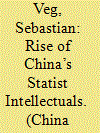| Srl | Item |
| 1 |
ID:
162263


|
|
|
|
|
| Summary/Abstract |
This article analyses the search and rescue (SAR) activities carried out by three NGOs (MOAS, MSF and Sea-Watch) in the Central Mediterranean, and asks whether and in how far non-governmental SAR contributes to the repoliticization of the EU maritime border. The article first introduces the concept of depoliticization/repoliticization, as well as that of humanitarianization. Two sections summarize the development of the SAR regime and the governmentalization of international waters in the Strait of Sicily from the Cap Anamur case to 2016, and from late 2016 to recent days. Against this backdrop, the article analyses the different political positions taken by MOAS, MSF and Sea-Watch, their operational activities, as well as their cooperation and relations with the other actors involved in SAR. The three NGOs react differently to the contradictions that are typical of humanitarian non-state action. MOAS keeps a neutral political profile, whereas MSF and Sea-Watch regard their SAR activities as part of a political, not only humanitarian commitment. While the convergence of delocalized state sovereignty and humanitarian reason leaves hardly any room for manoeuvre, MSF and Sea-Watch try to question and contrast governmental policies and practices, as well as to turn international waters into a political stage from which they can make their voice heard and on which they can play the watchdog role.
|
|
|
|
|
|
|
|
|
|
|
|
|
|
|
|
| 2 |
ID:
169196


|
|
|
|
|
| Summary/Abstract |
Beginning in the 1990s, a number of elite Chinese intellectuals developed new critiques of liberalism. Within the orbit of Marxism, a group often called the “new left” mainly concentrated on economic liberalism and inequalities of wealth. Some of them also showed an affinity with the views of intellectuals referred to as statists. The statists’ three main ideas can be summarized as the superiority of political sovereignty over the rule of law, a critique of the “judicialization” of politics and the need to “repoliticize” the state, and a critique of universalism and an assertion of Chinese exceptionalism. Some of the legal scholars who developed these ideas are directly influenced by Carl Schmitt (1888–1985), an authoritarian German legal scholar and political theorist. Important texts by the current Chinese group of statist thinkers provide an intellectual background to the recent evolution in Party ideology.
|
|
|
|
|
|
|
|
|
|
|
|
|
|
|
|